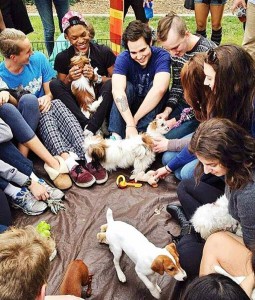 It’s early May, and Pomona students are stressing out in droves over final papers and upcoming exams. But never fear—help is near, with a wagging tail and a droopy ear. During the annual “De-Stress” event on the Smith Campus Center lawn, students take a little time off from studying to do something that is medically proven to reduce stress—that is, pet a puppy. For those allergic to doggie fur, the event also includes games, frozen snacks and plenty of pizza and camaraderie.
It’s early May, and Pomona students are stressing out in droves over final papers and upcoming exams. But never fear—help is near, with a wagging tail and a droopy ear. During the annual “De-Stress” event on the Smith Campus Center lawn, students take a little time off from studying to do something that is medically proven to reduce stress—that is, pet a puppy. For those allergic to doggie fur, the event also includes games, frozen snacks and plenty of pizza and camaraderie.
Blog Articles
Puppy Love
Celebrating the Class of 2015
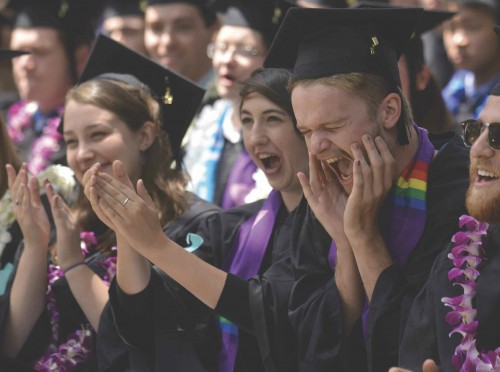
Members of the Class of 2015 show support for a classmate who just received a diploma during Pomona’s 122nd Commencement in May. During the ceremony, Michael Dickerson ’01, Andrew Hoyem ’57, Judge Stephen Reinhardt ’51, and France Córdova spoke and received honorary degrees from the College. Videos of the speakers are available at www.pomona.edu/events/commencement/archive/2015.aspx.
Under Prometheus
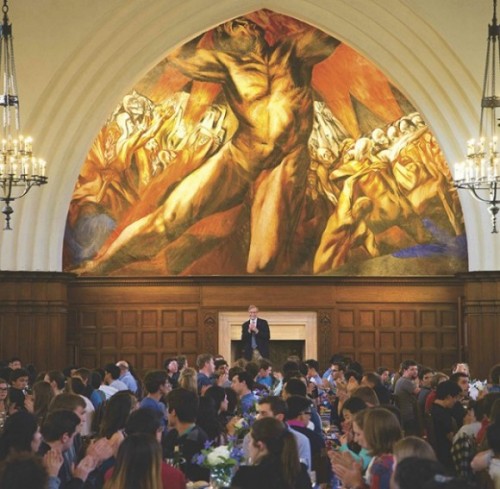
President David Oxtoby welcomes the members of the Class of 2015 to a Senior Dinner on April 7 beneath José Clemente Orozco’s fresco of Prometheus in Frary Hall.
Have a Jolly Holi

Since 2000, Walker Beach has been the site of The Claremont Colleges’ increasingly popular celebration of Holi, the springtime festival of colors and love that originated in India. Organized by the Claremont Hindu Society, with the support of the Office of Chaplains, the festival is celebrated as a carnival of bright colors, with participants throwing dry colored powder or colored water at each other until both crowd and surroundings appear to have been tie-dyed. Last March, more than 400 students from across the campuses took part in the 2015 festivities.
Edible Elements
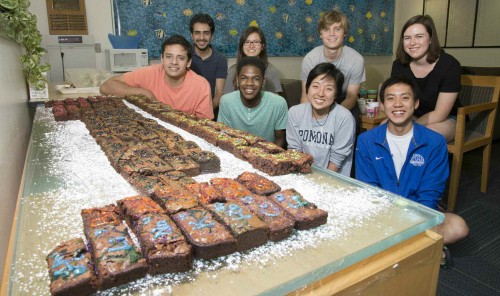
Each summer, the students working in Chemistry Professor Mal Johal’s research lab take a break from their work on ultra-thin assemblies to create a dessert version of the periodic table for one of their weekly barbecues. Past efforts have included cookies and cakes—this year, it was brownies, complete with rainbow sprinkles for the radioactive elements. Posing with their creation are: (from left, front row) Carlos Hernandez ’18, Devin Gladys ’17, Zi-Chen Liu ’18, Samuel To ’18, (back row) Kavoos Kolahdouzan ’18, Vanessa Machuca ’18, Conner Kummerlowe ’16 and Hannah Wayment-Steele ’15.
Eclectic Electives
Dance, Ethnicity and Nationalism looks at dance as a vehicle for achieving political goals and establishing ethnic identities. Students study such examples as Irish step dancing, Ukrainian and Russian folk dancing and the Hawaiian hula, all of which have served past regimes. Instructor: Anthony Shay
Disease, Destruction, & Disaster examines disaster as a social phenomenon and trends in managing and responding to threats and catastrophe. Students look at such case studies as Hurricane Katrina, Fuku-shima and the Ebola outbreaks. Instructor: Brady Potts
Drone Theory focuses on the drone as part of a network of ubiquitous, always-active sensors for automated data collection, processing and response. Looking at the drone through critical media theory, students think about asymmetrical power and remote control, and the historic relationship between military and media technology. Instructor: Mark Andrejevic
2019’s Got Class
Here are just a few of the many interesting and unique individual accomplishments reported by members of the admitted Class of 2019:
- One auditioned and was cast in a small role in the movie The Hunger Games (2012).
- One authored a neuroscience textbook in 11th grade: A Friendly Guide To The Adolescent Brain.
- One wrote five Apple Apps, which achieved 1,000,000 total downloads.
- One has written four full-length novels.
- One is a sous chef for a Michelin-starred restaurant.
- One is a master bee-keeper, the youngest in the state.
Founders Day and the New Millikan
Save the Date: October 3, 2015
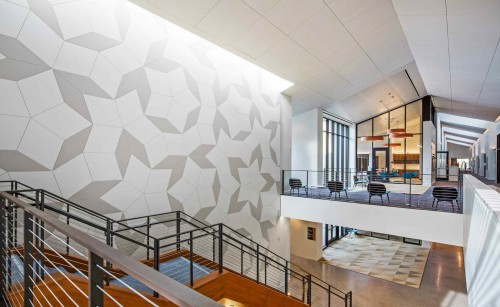
The focus will be on the wonders of physics, astronomy and mathematics during Pomona’s 2015 Founders Day, which will feature the official opening of the beautiful new Millikan Laboratory and the renovated Andrew Science Hall. The dedication ceremony is set to begin at 1:30 p.m., and to be followed by a range of interactive science and math activities for all age groups throughout the afternoon, ending around 7 p.m. Food trucks will be available for dinner from 4:30 to 6:30 p.m. The event is free and open to the public.
Cathedral Song
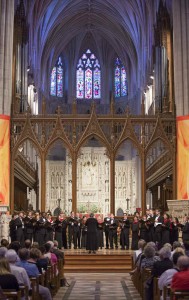 The spring tour of the Pomona College Glee Club took them to a range of performance spaces, from a high school gymnasium in New York’s Washington Heights to a retirement community in Stamford, Conn., to the Church of the Holy Trinity in Philadelphia. However, the undisputed highlight of the tour was a half-hour concert in the National Cathedral in Washington, D.C.
The spring tour of the Pomona College Glee Club took them to a range of performance spaces, from a high school gymnasium in New York’s Washington Heights to a retirement community in Stamford, Conn., to the Church of the Holy Trinity in Philadelphia. However, the undisputed highlight of the tour was a half-hour concert in the National Cathedral in Washington, D.C.
“To sing music in a space that is like what the composer thought about really brings the music to life in a way that we can’t recreate here on campus,” says conductor and Professor of Music Donna Di Grazia. “From an educational perspective as well as an artistic one—those things go hand in hand—there’s nothing like that experience for our students. … And then you also get to give this gift of music to those who come.”
Pomona-Pitzer Cracks Top 50 in Director’s Cup Rankings
For the first time in almost 20 years, Pomona-Pitzer Athletics reclaimed its spot in the top 50 nationally in the 2014–15 Learfield Sports Director’s Cup.

The Sagehens ranked 49th nationally (out of 332 NCAA Division III institutions) jumping from 63rd last year and 117th in 2012-13 and placing them second among SCIAC institutions. It is the highest finish for Pomona-Pitzer Athletics in the Director’s Cup standings since a 33rd-place finish in 1996–97.
Sponsored by the National Association of Collegiate Directors of Athletics (NACDA), the Director’s Cup is a program that honors institutions maintaining a broad-based program and achieving success in many sports, both men’s and women’s. The standings are calculated via a points system based on how teams finish in their national tournaments.
Pomona-Pitzer had a successful academic year from start to finish, with five teams, as well as numerous individuals, qualifying for the NCAA Championships.
In the fall, men’s soccer won the SCIAC Postseason Tournament to advance to the NCAA Division III Championship for the first time since 1980. Men’s cross country earned a team qualification to the nationals for the third year in a row, by taking a second-place finish in the NCAA West Regionals, and ended in 17th place, the team’s highest finish since 1982. Maya Weigel ’17, meanwhile, earned All-America honors for the women’s cross country team with a 22nd place finish, after claiming first place at the West Regionals.
The winter saw a strong season from the men’s and women’s swimming and diving teams, which both finished second in the SCIAC and had national qualifiers. In his first year, Mark Hallman ’18 earned All-America honors by qualifying for the finals in the 200-yard freestyle. For the women’s swimming and diving team, the 800-yard freestyle relay team of Vicky Gyorffy ’15, Maki Tohmon ’17, Kelsey Thomas ’18 and Victoria Vanderpoel ’18 earned All-America honors as well.
The Sagehens made their biggest leap in Director’s Cup standings during the spring semester, thanks to three teams that advanced to the round of 16 in the NCAA Division III tournaments.
Women’s lacrosse reached the round of 16 with its first-ever NCAA tournament win, defeating SCIAC rival Occidental at home after winning its first-ever SCIAC title by four games. Men’s and women’s tennis both moved on to the NCAA Regional Finals in May after earning top-10 rankings in the regular season, with the men reaching as high as third and the women as high as seventh. Men’s tennis defeated Texas-Tyler in the regional semifinals to reach the round of 16, while women’s tennis earned a win over Whitman. In addition, Connor Hudson ’15 qualified for the NCAA Division III Championships both in singles and in doubles after he and doubles partner Kalyan Chadalavada ‘18 reached the finals of the ITA Small College nationals in the fall, earning All-America honors. On the women’s side, Lea Lynn Yen ’16 and Grace Hruska ’18 qualified for the NCAA Championships in doubles.
Women’s water polo, which is not calculated in the Director’s Cup standings due to the small number of participating teams, added to the spring success for Pomona-Pitzer by tying for the SCIAC title with a 10-1 league record, the fourth year in a row that it has earned at least a share of the conference crown.
In addition to team successes in the spring, Weigel completed a fall-spring All-America sweep by finishing in seventh place nationally in the 800 meters for the women’s track and field team, while John Fowler ‘16 earned a top-10 finish (ninth) in the 5,000 meters. Tiffany Gu ’16 also earned a national qualification for the women’s golf team, finishing 30th out of 110 at the NCAA Division III Championships.
The late push in the spring enabled the Sagehens to pass Redlands (56th place) among SCIAC schools.